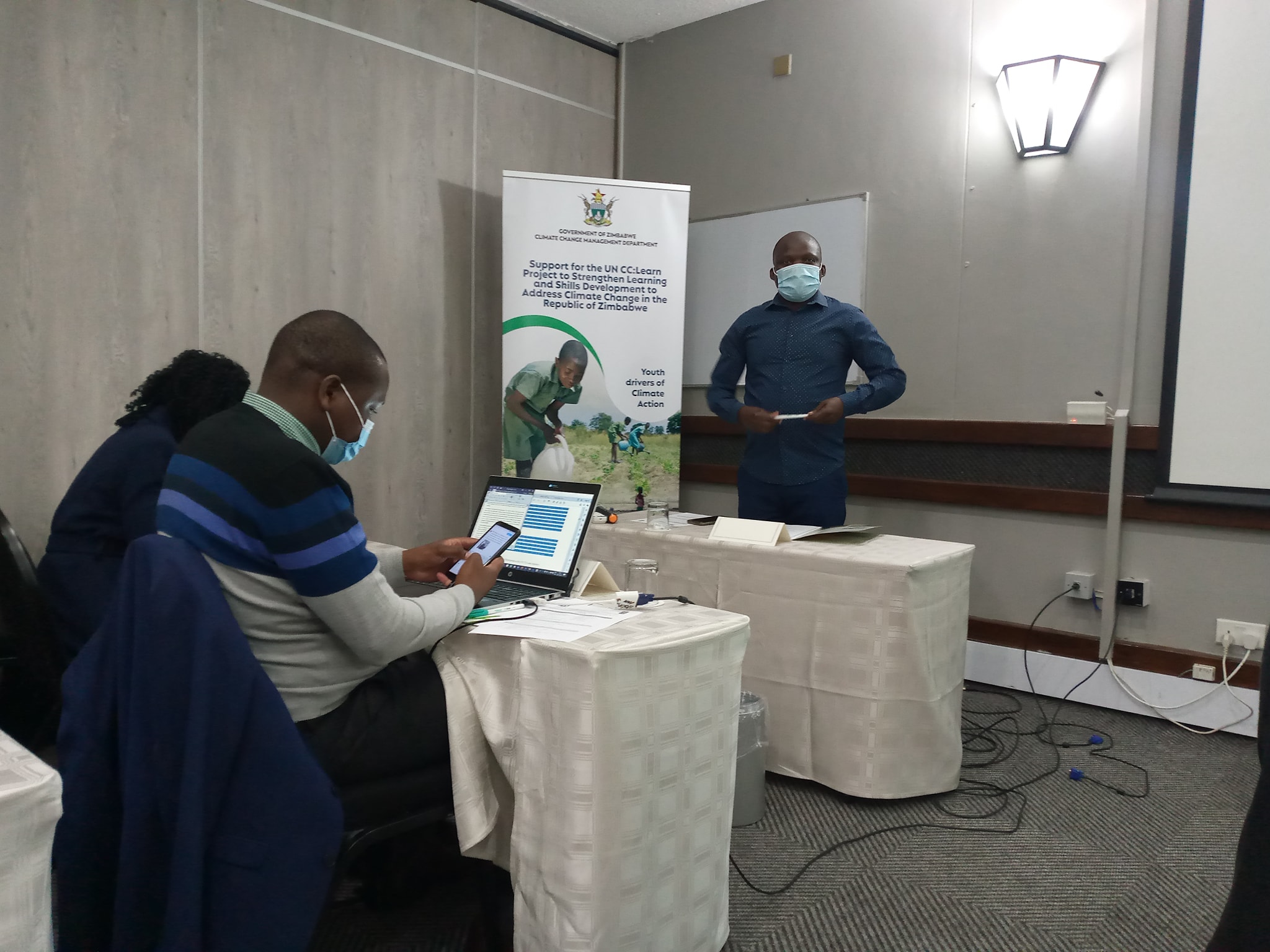|
Getting your Trinity Audio player ready…
|
Mr. Washington Zhakata, the Director in the Climate Change Management Department of the Ministry of Environment, Climate, Tourism and Hospitality Industry has underscored the need for young people’s needs and aspirations to be captured in the nationally determined contributions (NDCs).
He made the statement in his opening remarks read by Mr. Lawrence Mashungu, a Climate Change Mitigation Expert in the same Ministry at the youth dialogue meeting on the Nationally Determined Contributions (NDC) Target enhancement process held at the Holiday Inn Hotel meant to deliver a Youth Position Paper on the NDC enhancement process with recommendations for consideration.
The need for ambitious targets in the revised NDCs has been one of the major topics spoken about in the climate change space. As the revision process is being done, Mr. Zhakata said there is growing consensus that a key success factor for raising climate ambition is ensuring an inclusive process that brings together government at all levels with youth organizations, movements, and networks, as well as with other citizens, private sector, key stakeholders and partners.
2015 was a historic year in the climate change agenda. Parties came together under the Paris Agreement to transform their development trajectories so that they set the world on a course towards sustainable development, aiming at limiting warming to 1.5 to 2 degrees Celcius above pre-industrial levels. Nationally Determined Contributions (NDCs) are at the heart of the Paris Agreement and the achievement of these long-term climate goals. NDCs embody efforts by each country to reduce national emissions and adapt to the impacts of climate change.
Under the Paris Agreement, (Article 4, paragraph 2) NDCs must be submitted every five years, in advance of the UNFCCC Conference of Parties (COP) meetings to allow for global synthesis and additional action to be taken to increase ambition. Each successive NDC is intended to represent a progression beyond the previous NDC and reflect the highest possible ambition, given each Party’s specific national circumstances. An updated NDC and a roadmap for its implementation will require a clear understanding of the status of developments across a wide number of sectors.
He revealed that Zimbabwe’s first NDCs focused much on climate change mitigation in the energy sector covering prominently the power and transport sectors, as well as climate-smart agriculture which has mitigation co-benefits. The initial NDC targets aim to reduce energy-related GHG emissions per capita by 33% below the projected Business-As-Usual (BAU) scenario by 2030. Quite a number of mitigation and adaptation actions are being implemented all over the country towards attaining this target whilst complemented by various policy and institutional frameworks.
The Government has elaborated a National Climate Change Response Strategy and a National Climate Policy to guide climate change work in the country. Various other Policies have been developed and have climate change considerations such as the Renewable Energy Policy, Biofuels Policy, and the Industrial Development Policy.
“There are prospects to develop climate change legislation that will establish a firm well-defined institutional structure for climate change management in the country; establish a National Climate Change Funding Mechanism; and, ensure climate change is mainstreamed in planning and budgetary processes at national and sub-national levels as well as facilitate access to data for monitoring, reporting and verification purposes.
“Achieving Zimbabwe’s NDC targets requires measures that ensure that all different population groups can adapt to climate change, strengthen their resilience, and help reduce emissions of greenhouse gases. Zimbabwe’s Low Emission Development Strategy (LEDS) {2020-2050} sets the course for reducing emissions, while at the same time ensuring sustainable economic development for the country. It is based on the government’s economic planning up to 2050 and covers mitigation measures in all Intergovernmental Panel on Climate Change (IPCC) sectors which are Energy; Industrial Processes and Product Use (IPPU); Agriculture, Forestry and Other Land Use (AFOLU); and, Waste. Therefore, the immediate process of revising the NDC provides an opportunity to support collaboration amongst government agencies and increase mutual understanding amongst government, industry and the community for top-priority actions, as well as the roles and responsibilities of different agencies. This will include awareness of additional finance requirements to implement achievable, cost-effective but socially inclusive emissions reductions across various sectors of the economy,” Mr. Zhakata said.
Jean-betrand Mhandu, the National Coordinator of the African Youth Initiative on Climate Change Zimbabwe (AYICC-Zim) and the regional director of the Earthday.org said building up from the UN CC:Learn, youth online and rural youth capacity buildings, provincial youth consultations on the NDCs process will be highly recommended as a way of reaching out to more young people on the key sectors targeted by the revised NDCs.
“The current NDCs lacked a broader youth consultative approach which is very critical as referred to by Objective 2 of CAEP which highlights the importance of taking a whole-of-government and whole-of-society approach to strengthen and implement the NDCs, in this case, the importance of inclusivity indicated putting youth at a greater advantage of being key stakeholders,” Mr. Mhandu said.
His counterpart at AYICC-Zim, Elizabeth Gulugulu Machache, said the current NDCs process has potential to unlock green jobs and other opportunities for young people in the energy sector.
“The youths can tap into renewable energy technologies, come up with various innovations in the Waste sector, manufacture environmentally friendly machines in the IPPU sector and finally venture into sustainable livelihoods as to protect nature whilst contributing to the AFOLU sector. This can only be possible if young people are aware of the current NDCs process and are fully engaged through consultations, radio programs, physical meetings if possible, and virtual focus group discussions. These discussions can be done nationally and regionally to produce a youth national position paper,” Machache said.
